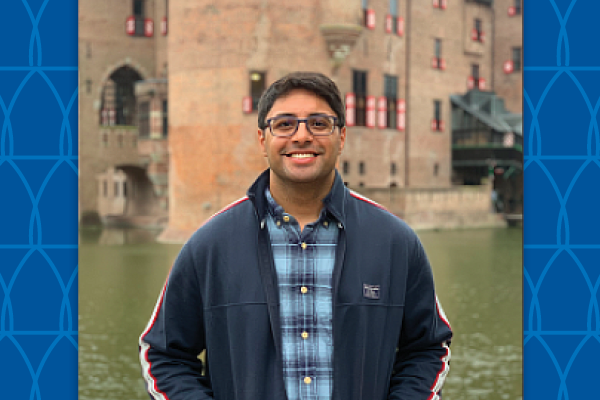PhD Student Niven Singh wins Best Poster Award at international conference

Niven Singh, a 5th year PhD student in Duke’s Computational Biology & Bioinformatics program, earned a “Best Poster Award” during the 11th International Conference on Biological Physics in Seoul, South Korea in August. Singh and his lab partner were the only two students from Duke University to attend, and just two of the four students total from the US to participate.
The poster, titled Universal Electrostatic Control of Flavin Reduction Potentials, won first prize in the Simulations of Biomolecules category for the first poster session. Peng Zhang, PhD, associate research professor in the Duke Department of Chemistry and David Beratan, PhD, R.J. Reynolds Distinguished Professor of the Duke Department of Chemistry, Singh’s advisor, served as co-authors of the presentation.
The team’s project was purely theoretical and stemmed from Singh’s desire to design artificial proteins. Flavins are compounds that participate in one-and two-electron chemistry and act as catalysts in reactions between electrons. The team performed a comparative study between flavoproteins that can receive and transfer one or two electrons. “The two-electron part is completely new,” Singh said. “Flavins are just so ubiquitous in nature, that when you find something new related to them, you know that it'll have a big impact or be applied in many research groups,” Singh said.

Singh said this was the first conference he ever attended, which made it even more shocking to him when he won the award. “They walked over to me and said, ‘Congratulations, you won.’ I asked, ‘Won what?’ They said, ‘The best poster.’ I asked if they were sure, and they said yes and told me not to be late for the ceremony,” Singh joked. “While I am grateful for winning, I never expected that to happen.” A ribbon was placed on his poster, which got the attention of several attendees. “Winning something like this provides you with some validation and motivation to keep going with your project,” he said.
The conference featured several talks led by well-known faculty members from around the world, presentations, and two poster sessions. Topics of discussion ranged from molecular biophysics to polariton chemistry, and fluid dynamics. Attendees were encouraged to ask questions after each session, as presenters were always eager to discuss their research. “Professors mostly came up to my poster, who were using flavins in a different way, and asked me questions. It was surreal,” he said.
“It was exciting to show people who have studied the one-electron process for so many years, what the two-electron picture looks like, and basically showing them that you can use one and two-electron transfers as a comparison for how you can tune the chemistry,” Singh said. “Even if the scientists are not specifically studying two-electron chemistry, they would still be able to understand the physical principles behind what you're doing, and this might potentially affect some of their ongoing work as well,” he continued.
While this is an ongoing long-term project, Singh believes they will begin working on a finalized draft soon. They hope to one day answer questions about how scientists can control redox potential orderings, specifically for normal versus inverted potentials. Normal potentials are when the energy of electron two is higher than electron one, and inverted potentials are when the energy of electron two is lower than electron one.
Singh said having the answers to these questions will help with designing new proteins or modifying existing ones. “You just need to know what modifications to make.”
Singh is especially grateful to his co-authors for all the progress they’ve made so far. “This project wouldn’t have been possible without the help of Dr. Zhang and Dr. Beratan. Giving me the time to work on something long-term is not a privilege everyone gets, so I’m thankful for not only their support and guidance, but also their patience,” he said. “I also appreciate the support and encouragement I got from my lab mates.” Out of 250 presenters, Singh was one of 14 winners who received a best-poster prize.